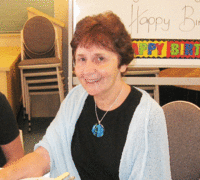 Reflection
Reflection
Veronica Lawson RSM
Luke 13:22-30
We all know people or groups who seem to have an ingrained sense of entitlement or privilege, people who put themselves first without regard for the feelings or rights of others. Whether their behaviour derives from childhood experiences of over-indulgence or from some other source, it can be quite destructive of family and workplace and community. Those who consistently put themselves first will often find themselves last in the sense that they are tolerated rather than welcomed in most circles.
Jesus’ questioner in today’s gospel story is ‘someone’, presumably a Jew like himself, whom he encounters on his journey to Jerusalem. His question is about salvation: ‘Will only a few be saved?’ or, more accurately, ‘Are only the few saved?’
Jesus treats it as a rhetorical question that presupposes an affirmative answer. His answer could be interpreted as affirmative, even if it is a far cry from the expected response. While the question comes from one person, Jesus’ response is ‘to them’. They have shared table fellowship with him, and may even be among those who objected (in Luke 7:24) to Jesus’ less than desirable table companions, the tax-collectors and sinners. Now the tables have turned. It would come as no surprise to a Jewish audience to hear that the basileia belongs to Abraham, Isaac, Jacob, and all the prophets. Jesus’ assertion that it also belongs to ‘people’ who come from far and wide, ‘from east and west and north and south’ might be less than palatable to those who see themselves as ‘first’ in the schema of salvation.
Those who share in the banquet in God’s basileia (the ‘saved’) have prevailed in the struggle to enter through the ‘narrow door’. Entry is by no means restricted to the descendants of Abraham: it belongs to all who hear the word of God and put it into practice. The ‘salvation’ or inclusion of outsiders will cause grief among ‘evil-doers’, among those table companions of Jesus who hear his teaching without understanding (Luke 8:10; 10:23-24) and consequently without committing themselves to the struggle to establish God’s reign of justice and peace and reconciliation. There is no privileged access to salvation on the basis of birth or race or any other contingency.
While the ‘door’ to salvation may be ‘narrow’, it is open to all who hear the word of God with understanding.